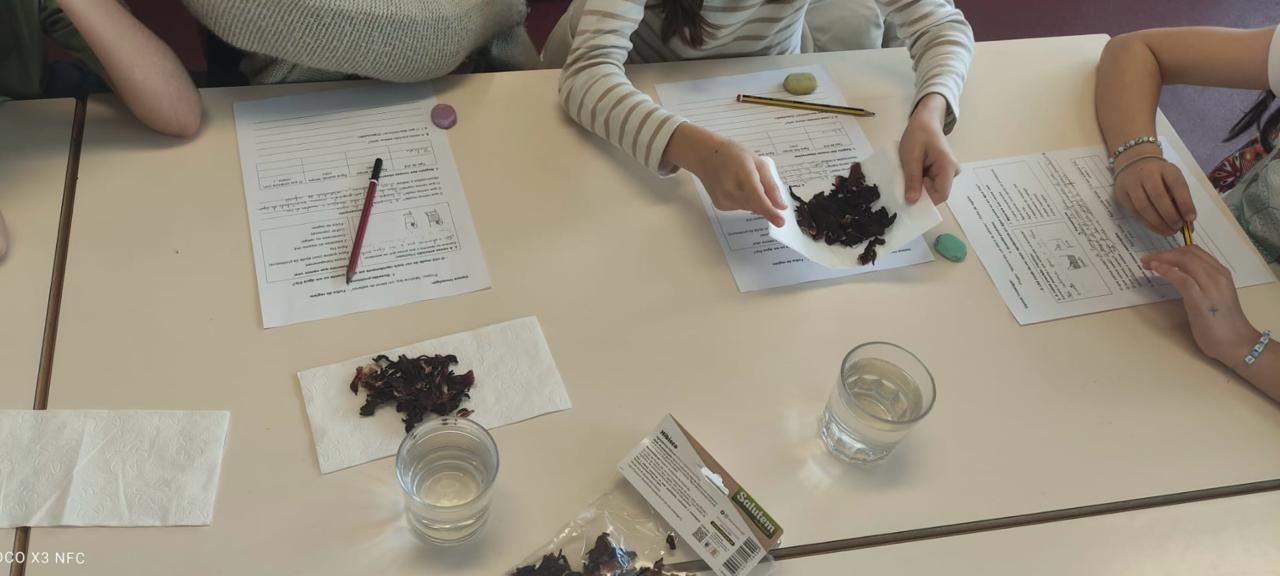Tea-mixture: A Blend of Knowledge
Institution
Agrupamento de Escolas Miguel Torga
Institution Typology
School
Country
Portugal
Stakeholders involved
4th year students
Teachers
Families
School community
Summary
The activity had tea as a unifying theme and involved scientific experiments on the tea infusion process and the influence of temperature on the speed of color change and intensity of the infusion, the creation of infusers with recycled materials, the making of paintings using tea as a pigment, the resolution of mathematical problems related to proportions and quantities, and the production of digital presentations on the tea production cycle. The project culminated with the holding of a "Tea Fair", in which students presented and shared their work and learning with the school community.
CONTEXT AND OBJECTIVES
Problem addressed or learning needs
Needs:
- development of students' scientific, logical and creative thinking in real contexts.
- practical application of mathematical concepts
- development of digital skills in the creation of multimedia presentations.
- encouragement of environmental awareness and collaborative work.
Educational goals pursued:
- Cognitive: Understanding of physical phenomena (infusion, dissolution), mathematical operations with proportions, and production processes.
- Metacognitive: Reflection on research processes and on the food production cycle.
- Collaborative: Work in small groups in the various activities (scientific experiment, construction of infusers, production of presentations).
- Creative: Artistic production (tea painting, infuser decoration) and material design.
Types of enhanced competences
- Scientific thinking and experimental research.
- Logical reasoning and mathematical problem solving.
- Digital literacy and use of presentation tools.
- Artistic expression and product design.
- Teamwork and collaborative communication
METHODS, STRATEGIES AND TOOLS
Subjects involved
Humanities, Technologies\Engineering, Math, Natural Science, Civic education, Arts
Duration and timeline of implementation
Developed for a month
Weekly activities (1 or 2 hours per subject)
Public presentation at the end -Tea market
Strategies and activities
Science: Science experiment – "Does tea change color faster in hot or cold water?"
Technology: Research and creation of digital presentations – "From the plant to the cup"
Engineering: Design and construction of tea infusers with recycled materials.
Arts: Tea painting and packaging and infuser design.
Mathematics: Solving Problems of Proportions – "How Much Tea Do I Need?"
Citizenship: Discussion on sustainability and conscious use of resources
Material Sources
- Computers, tablets, chronometers
- Digital apps like Canva or Clipchamp
- Recycled materials (net, coffee filters, fabric, plastic, string
- Assorted teas, brushes, paper, cardboard
Methodology
Team Work, Cooperative Learning, Storytelling, Learning By Doing, Inquiry-Based Learning, Digital Storytelling, Technology-Enhanced Active Learning (Teal), Debate
IMPACT AND RESULTS
Impact
n. of students involved - 60
n. of teachers involved: 4
n. of schools involved – 1
Observed Benefits
- Improvement of students' scientific and logical reasoning.
- Development of digital and communication skills.
- Stimulation of creativity and critical thinking.
- Awareness of sustainability practices.
- Strengthening of collaborative work and students' self-esteem.
Challenges Faced
- Time management to complete hands-on activities and digital presentations.
- Adaptation of digital tools for different levels of competence of students.
- Ensure safety in the use of hot water and construction tools.
LESSONS LEARNT AND RECOMMENDATIONS
Key Success Factors
- Interdisciplinary approach in real student contexts
- Strong affective and creative involvement of students in the activities.
- Use of accessible and motivating digital tools.
- Integration of sustainability practices.
Future Improvements
- Integrate short tutorial videos made by the students themselves to present their projects.
- Make the Tea Fair an annual event open to more classes or schools.
- Online dissemination of projects to motivate other schools.
Recommendations
- Promote interdisciplinary STEAM projects focused on everyday themes.
- Encourage the creative use of recyclable materials in educational projects.
- Develop students' digital autonomy through hands-on projects.
- Valuing oral and digital communication as part of teaching-learning processes

